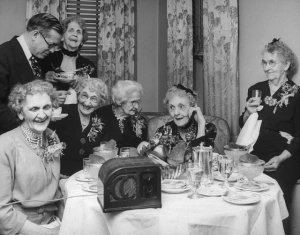
Misty Kiwak Jacobs
December 24, 2023
Advent IV
Preached at St. John’s, Williamstown
Christian tradition has enshrined Mary of Nazareth in chalkware statues, her blonde head bowed in humility over pale, folded hands. In reality she was a young Jewish woman, a peasant with dark hair and dark eyes, whose hands were likely brown and calloused from hard work.
Tradition has held up Mary as the ideal of purity, focusing on her words, “How can this be since I am a virgin?” Instead she chose to enter into the chaos of unplanned pregnancy and public shame for the sake of Divine Mercy.
Mary embraces social stigma so that she might bear disruption in her body: the disruption of the natural order, birthing the God of creation from her created self so that God might be one of us.
Mary is literally possessed by God, occupied by Jesus, her body a tabernacle of Divinity, the humanity of Jesus drawing on Mary’s life for sustenance.
For centuries Mary has been held up as an icon of feminine submission “who pondered things in her heart” (Luke 2:19). But the reverse is true: Mary uses her privilege as the Christ-bearer to proclaim the work of God.
A few passages after today’s gospel, Mary meets Elizabeth. When Elizabeth acknowledges the great task Mary has undertaken, Mary sings the Magnificat, a song of LIBERATION TO THE OPPRESSED. Does this sound political? It is.
She glorifies a God who scatters the proud; who brings down the mighty from their thrones, a God who exalts the humble; who fills the hungry with good things, and sends the rich away empty.
The Magnificat is modeled on Hannah’s prayer in 1 Samuel:
The bows of the mighty are broken,
but the feeble gird on strength.
Those who were full have hired themselves out for bread,
but those who were hungry have ceased to hunger.
The barren has borne seven,
but she who has many children is forlorn.
The Lord kills and brings to life;
he brings down to Sheol and raises up.
The Lord makes poor and makes rich;
he brings low, he also exalts.
He raises up the poor from the dust;
he lifts the needy from the ash heap,
to make them sit with princes
and inherit a seat of honor. (1 Sam. 1:5-8).
We find in scripture other women singing songs to God that have political implications:
In Exodus, when the Israelites have escaped the Egyptians, we hear from the Prophet Miriam:
For when the horses of Pharaoh with his chariots and his horsemen went into the sea, the Lord brought back the waters of the sea upon them; but the people of Israel walked on dry ground in the midst of the sea. Then Miriam, the prophetess, the sister of Aaron, took a timbrel in her hand; and all the women went out after her with timbrels and dancing. And Miriam sang to them:
“Sing to the Lord, for he has triumphed gloriously;
the horse and his rider he has thrown into the sea.” (Exodus 15: 19-20).
And then there’s this cheerful little ditty from the Prophet Deborah, celebrating an Israelite woman’s thwarting of a Canaanite commander who entered her tent:
“Most blessed of women be Ja′el,
the wife of Heber the Ken′ite,
of tent-dwelling women most blessed.
He asked water and she gave him milk,
she brought him curds in a lordly bowl.
She put her hand to the tent peg
and her right hand to the workmen’s mallet;
she struck Sis′era a blow,
she crushed his head,
she shattered and pierced his temple.
He sank, he fell,
he lay still at her feet;
at her feet he sank, he fell;
where he sank, there he fell dead.”
Mary sings in a long tradition of Hebrew women proclaiming the justice of God.
In an act of abject vulnerability, a woman has invited Godself into what most intimately defines her womanhood, into the creativity of her womb. A woman has consented to be a vehicle of radical disruption of the natural order, of the social order, or the political order.
Dean Andrew McGowan writes,
“The coming of Jesus announced to Mary is not primarily the sign that God can do what we cannot; it is the sign of what in particular God is doing. The God made known in Jesus Christ will be with us as the bearer of a new hope. . .”
Mary’s consent to God’s plan is the fulfillment of hope promised by the prophet Isaiah who foretold, Therefore the Lord himself will give you a sign. Behold, a young woman[ shall conceive and bear] a son, and shall call his name Immanuel” – God with us (Isaiah 7:14).
The conduit of GOD WITH US is the fecundity of a woman. God with us because God depended on nurturing by a woman. God with us so that we may be MORE LIKE GOD.
God with us so that we can LOVE like God, love unto madness. God with us so that we might BEAR HOPE to the oppressed. Hope that unveils the stark absurdity of injustice: homelessness, racism, hunger, lack of access to medical care, war.
Invite God in and God will disrupt. Have you heard God’s still small voice? Have you said “Yes”? Let your own “Yes” to God’s will empower you to afflict the comfortable and to comfort the afflicted. May you be a conduit of hope to the world.
Come, Lord Jesus. Come

